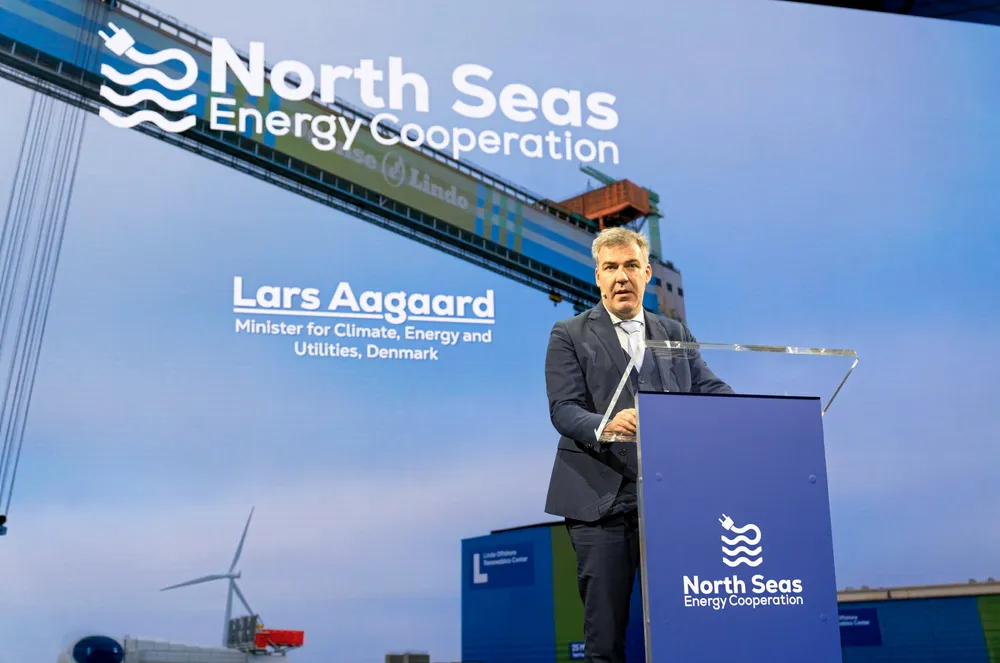NSEC nations issue checklist for turning North Sea basin into Europe's greatest green energy hub
A more transparent view of long-term demand was identified as a key enabler for a development of a stronger supply chain

North Sea basin countries taking part in a North Sea Energy Cooperation (NSEC) gathering in the Danish port of Odense, have issued a set of recommendations on how Europe can deliver on its renewable energy ambitions and strengthen its competitiveness.
The Odense-recommendations, which are intended to provide non-binding for members of a newly constituted EU Commission, called for new approaches to the financing of cross-border offshore energy projects and better integration of offshore wind expansion with renewable hydrogen production, among other things.
The recommendations, agreed by energy ministers from Denmark, Belgium, France, Germany, Ireland, Luxembourg, the Netherlands, and Norway were intended to promote the expansion of renewable energy in the North Sea.
The initiatives attempted to address the challenges posed to Europe’s industry in a situation where “supply chains are under pressure, costs have gone up, and global competition has increased”, noted Danish Minister for Climate, Energy and Utilities Lars Aagaard, whose was hosting the meeting.
Cross-border offshore energy projects and and new approaches for sharing the benefits and costs of large infrastructure projects.were identified as essential for connecting the North Seas’ green energy potential with the rest of Europe.
“We recommend some very concrete measures that we know the industry currently lacks. It is absolutely crucial for the future of cross-border offshore energy projects that we can split the meal and the bill more fairly," Aagaard said.
A framework for the cost-benefit sharing of cross-border projects is still missing, he suggested, arguing that countries that need and consume the green energy should share more of the cost.
The NSEC recommended that the EU Commission examine the potential of a regional offshore wind facility to strengthen financing of cross-border offshore wind projects.
The need to increase transparency and predictability across the entire supply chain for offshore renewable energy was also highlighted, with proposals including establishment of a digital tool, containing a pipeline of tenders and auctions, manufacturing capacity of key components, production facilities in Europe and capacity in the ports.
"We must be able to see where the demand for green energy will be many years ahead, so that we can plan our infrastructure accordingly and align it with production and demand. We need decisive green action to secure the future of Europe’s competitiveness,” Aagaard said.
Recommendations included:
- Establishing a "Transparency Framework" that provides a better overview and clarity regarding tenders and their timelines and better insights into port facilities for wind turbine shipping, production facilities, and other demands.
- Commission action in following up on the Draghi Report on European competitiveness.
- Commission action to ensure a closely coordinated use of non-price criteria to strengthen European industry and resilience.
- Additional steps to make permitting procedures more effective for renewable energy projects.
- Enhancing access to EU funding for energy projects by streamlining procedures and promoting projects of European value (PCI projects).
- Introduce a longer time horizon for future network development plans to ensure optimal planning for infrastructure projects and to focus more on connecting renewable energy potential to demand centers.
- Steps to support the development of renewable hydrogen in the North Seas by improving infrastructure integration and planning.
- Building on the MoU between the (NSEC and the UK
Giles Dickson, CEO of industry association, emphasised growing support for pre-qualification criteria and non-price award criteria in in wind energy auctions, seen as way of strengthening Europe’s clean tech manufacturing.
“Well done to the North Seas Energy Ministers for identifying exactly what needs to happen to increase momentum on offshore wind. And for spelling out clearly what the EU needs to do to on this over its new five-year mandate," he said
The NSEC was created on the premise that the North Sea basin can become Europe’s leading green energy hub, providing reliable and lower cost clean energy to boost European industrial competitiveness and create green jobs.
The NSEC is based on a political declaration adopted in 2016, with membership comprised of Ireland, Belgium, Denmark, France, Germany, Luxembourg, the Netherlands, Norway, Sweden, and the European Commission.
In December 2022, the UK signed an agreement on renewable energy cooperation with the EU and NSEC countries, covering electricity interconnectors, wind farms and offshore grids in the North Sea, including the Irish and Celtic Seas.
(Copyright)